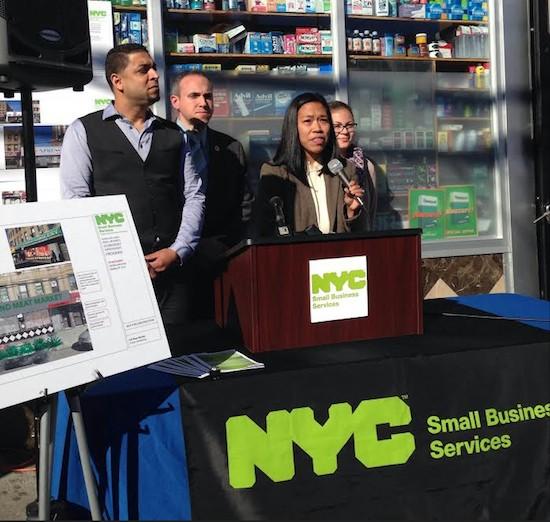
Small Busniess Services Commissioner Torres-Springer (photo: @SBSNeighborhoods)
Although New York City's unemployment rate has plummeted in recent months, economic recovery remains little more than a rumor for the more than 300,000 New Yorkers between 18 and 24 years old who are not in school and out of work or stuck in low wage jobs—a number comprising 35 percent of all New Yorkers in that age range. For this group, the shortcomings of New York City's workforce system bear depressing similarity to the drawbacks that marred their experiences in public education. Both offer too little relevance to their current challenges and long-term needs.
The workforce system's disconnection from economic development investments and priorities, and the failure of many related programs to deliver market-relevant education and training, do not serve young adults who need to build skills and gain experience.
This past spring, Mayor Bill de Blasio convened the Jobs for New Yorkers Task Force, a 30-member committee of noted corporate executives (including JobsFirstNYC board member Greg Hambric of Modell's Sporting Goods), educators, philanthropists, union leaders, city officials and nonprofit service providers, to develop strategies to strengthen the city's workforce system and help workers to secure well-paying jobs in high demand careers. The Task Force was assigned to make recommendations to spend the City's nearly $500 million workforce development budget more effectively. The recently released Career Pathways: One City Working Together, fulfills this charge.
A bid to shift the system's focus from quick placement into low wage jobs to emphasis on careers, the scope of Career Pathways is unprecedented. The recommendations would shift how the City spends more than $150 million annually and impact operations within no less than eight city agencies, including the Department of Education and the City University of New York, as well as hundreds of business owners and nonprofit organizations. The task force identified two major organizing principles to enable this change: Industry Partnerships and Career Pathways. While both strategies offer promise, the report leaves many crucial questions unanswered.
Industry Partnerships would serve as intermediaries between employers and service providers. But the report does not address the structures or authority of these partnerships, nor does it identify what role nonprofits will play within this structure. Career Pathways align and coordinate education and training programs toward career progression. Exactly how the City will manage this complex transition from rapid attachment to career development is not discussed in the report.
Also unclear is how the plan would change the career trajectory of those young adult New Yorkers who lack the skills to compete for jobs that pay living wage or stuck in low-wage jobs.
One option for the City to consider is work being done by organizations like JobsFirstNYC to develop sector-based partnerships that may also be well-positioned to support certain constituents like young adults. The Young Adult Sectoral Employment Project, created by JobsFirstNYC and supported by private philanthropy, could serve as a primer for developing a broader array of industry-specific partnerships.
Given the scale, complexity, and duration of the challenges facing young adults in the labor market, we urge the City to formalize a position with respect to this important group and identify a vehicle that can help more of these young adults connect to training and educational opportunities, as well as to employers.
JobsFirstNYC has proposed the creation of a network of Youth Opportunity Centers in the 18 communities that are home to more than half of the 35 Percent. Because so many of these young adults are unlikely to seek assistance outside their communities, we must bring help to them.
The Youth Opportunity Centers—operated by community based organizations that are known and trusted by residents—could serve as the locus for a range of services to reconnect young adults to education, help them to develop career plans, and link them to training, internships, apprenticeship programs, and jobs. Similar models across the country, such as the Los Angeles YouthSource Centers, have proven highly effective at connecting more young adults to education and employment.
While the City's thoughtful and long-overdue reassessment of its approach deserves credit, it is much easier to release a report than to actually see through a years-long effort of systems change. As the Mayor's Office of Workforce Development and key workforce agencies—including the NYC Department of Education, Department of Small Business Services and Human Resources Administration—begin to implement the recommendations of the Task Force, we urge them to engage a constellation of other actors who have experience in developing industrial partnerships (better known as sector partnerships), and career pathways training. Likewise, partners in this work must include nonprofits who will deliver services on the ground, and customers themselves.
The recommendations made by the Jobs for New Yorkers Task Force carry potential for real progress toward increasing the incomes of low-income New Yorkers, and represent an important start toward creating a workforce system worthy of the City it serves. But the real work has only just begun, and we hope the City will engage the full range of actors necessary to address such an ambitious agenda. At JobsFirstNYC, we remain focused on advancing economic opportunity for all young New Yorkers.
***
Louis Miceli is Executive Director of JobsFirstNYC, a nonprofit intermediary focused on connecting young adults to the economic life of New York City.




